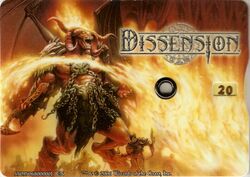Category:Ravnica block
- Not to be confused with Category:Return to Ravnica block.
The Ravnica block is the 11th block, comprising of the large expansion Ravnica: City of Guilds (Template:Set symbol) and the two small expansions Guildpact (Template:Set symbol) and Dissension (Template:Set symbol). The block was released in 2005–2006.
Sets
 |
 |
 |
|---|
Details
Development codenames
The development codenames for Ravnica block expansions are "Control", "Alt", and "Delete".[1]
Themes and mechanics
Themes
Thematically, the Ravnica block was multicolor-centered and, thus, was the spiritual successor to the Invasion block of 2000–2001. The Ravnica block was the first block to introduce the "guild model", wherein a number of guilds, each of which with its own cards and abilities and/or keywords, would be as introduced in an expansion and be as developed and complex as they would be (until returning to the block, as in Return to Ravnica block), rather than the traditional model of expansions, wherein abilities and/or keywords would be introduced in the first of usually three expansions and then progressively increase in complexity throughout the block.
Mechanics
The keywords introduced in the Ravnica block were:
In addition to these 10 keywords, the Ravnica block was the first block to feature hybrid mana costs and hybrid cards. Each of Ravnica's 10 guilds featured three hybrid cards, one at each level of rarity as of then; common, uncommon, and rare.
Mega cycles
11 mega cycles, each comprising 10 cards, one for each Guilds of Ravnica, are featured across the block. The exception to this is the "unbalanced gold card" cycle, which has two cards for each guild.
- Guild Champions: Grand Arbiter Augustin IV, Teysa, Orzhov Scion, Agrus Kos, Wojek Veteran, Tolsimir Wolfblood, Circu, Dimir Lobotomist, Tibor and Lumia, Momir Vig, Simic Visionary, Lyzolda, the Blood Witch, Savra, Queen of the Golgari, and Ulasht, the Hate Seed — These legendary multicolor creatures, one for each two-color pair, and each costing, rewarded players for playing with cards of their two colors, often doubly so for using multicolor cards. For instance, Augustin reduced the cost of white spells and blue spells by
 , and multicolor white/blue cards by
, and multicolor white/blue cards by  .
. - Guildmasters: Isperia the Inscrutable, Ghost Council of Orzhova, Razia, Boros Archangel, Chorus of the Conclave, Szadek, Lord of Secrets, Niv-Mizzet, the Firemind, Experiment Kraj, Rakdos the Defiler, Sisters of Stone Death, and Borborygmos — These legendary multicolor creatures, one for each two-color pair, and each of which cost a certain amount of colorless mana plus two mana each of their respective colors, produced powerful effects thematically tied to their respective colors. For instance, Niv-Mizzet allows for both card-drawing (a blue trait) and direct damage (a red trait).
- Guildmages: Azorius Guildmage, Orzhov Guildmage, Boros Guildmage, Selesnya Guildmage, Dimir Guildmage, Izzet Guildmage, Simic Guildmage, Rakdos Guildmage, Golgari Guildmage, and Gruul Guildmage — Each of these uncommon 2/2 creatures costs two hybrid mana of its guild's colors. Each has two activated abilities relating to its guild's colors. For instance, Simic Guildmage can move auras from one creature to another (a blue ability) and +1/+1 counters from one creature to another (a green ability).
- Common Hybrid Spells: Minister of Impediments, Mourning Thrull, Boros Recruit, Centaur Safeguard, Lurking Informant, Petrahydrox, Shielding Plax, Riot Spikes, Gaze of the Gorgon, and Wild Cantor — Each of these common spells has exactly one hybrid mana in its mana cost.
- Rare Hybrid Spells: Dovescape, Debtors' Knell, Master Warcraft, Privileged Position, Shadow of Doubt, Djinn Illuminatus, Biomantic Mastery, Avatar of Discord, Gleancrawler, and Giant Solifuge — Each of these rare spells has at least two hybrid mana in its mana cost.
- Guild Artifacts: Walking Archive, Moratorium Stone, Sunforger, Crown of Convergence, Bloodletter Quill, Mizzium Transreliquat, Evolution Vat, Rakdos Riteknife, Plague Boiler, and Gruul War Plow — Each of these rare artifacts have an ability thematically linked to its guild, requiring mana of both of that guild's colors to take full advantage of it.
- Signets: Azorius Signet, Orzhov Signet, Boros Signet, Selesnya Signet, Dimir Signet, Izzet Signet, Simic Signet, Rakdos Signet, Golgari Signet, and Gruul Signet — Each of these common artifacts has "
 ,
,  : Add (one mana each of the respective guild's color) to your mana pool."
: Add (one mana each of the respective guild's color) to your mana pool." - Bounce Lands: Azorius Chancery, Orzhov Basilica, Boros Garrison, Selesnya Sanctuary, Dimir Aqueduct, Izzet Boilerworks, Simic Growth Chamber, Rakdos Carnarium, Golgari Rot Farm, and Gruul Turf — Each of these common lands has "This card comes into play tapped. When this card comes into play, return a land you control to its owner's hand." Each could be tapped for one mana each of the appropriate colors. Each was illustrated by John Avon.
- Guild Lands: Prahv, Spires of Order; Orzhova, the Church of Deals; Sunhome, Fortress of the Legion; Vitu-Ghazi, the City-Tree; Duskmantle, House of Shadow; Nivix, Aerie of the Firemind; Novijen, Heart of Progress; Rix Maadi, Dungeon Palace; Svogthos, the Restless Tomb; and Skarrg, the Rage Pits — Each of these uncommon lands, representing the headquarters of each of Ravnica's guilds, could be tapped for
 . Each also had an activated ability whose cost included one mana of each of its guild's respective colors, tied to each guild's theme. For instance, Vitu-Ghazi could produce saproling tokens, which was beneficial to the Selesnya Conclave's Convoke ability. Each was illustrated by Martina Pilcerova.
. Each also had an activated ability whose cost included one mana of each of its guild's respective colors, tied to each guild's theme. For instance, Vitu-Ghazi could produce saproling tokens, which was beneficial to the Selesnya Conclave's Convoke ability. Each was illustrated by Martina Pilcerova. - Shocklands: Hallowed Fountain, Godless Shrine, Sacred Foundry, Temple Garden, Watery Grave, Steam Vents, Breeding Pool, Blood Crypt, Overgrown Tomb, and Stomping Ground — Each of these rare dual lands had two basic land types, could be tapped for two colors of mana, and came into play tapped unless its controller paid 2 life. Each was illustrated by Rob Alexander.
- Common Gold Ability Spells: Each of these common gold cards hold the guild's ability — Guardian of Vitu-Ghazi, Plumes of Peace, Perplex, Gobhobbler Rats, Scab-Clan Mauler, Vigean Hydropon, Leap of Flame, Rally the Righteous, Blind Hunter, Shambling Shell.
- Unbalanced Gold Cards: Each of these cards are one of 2 gold cards for every guild that have 2 of one color and only 1 of the other, with rarity varying: Azorius: Azorius Ploy and Swift Silence; Orzhov: Souls of the Faultless and Culling Sun; Boros: Flame-Kin Zealot and Firemane Angel; Selesnya: Congregation at Dawn and Phytohydra; Dimir: Clutch of the Undercity and Mindleech Mass; Izzet: Goblin Flectomancer and Invoke the Firemind; Simic: Omnibian and Voidslime; Rakdos: Anthem of Rakdos and Rakdos Augermage; Golgari: Drooling Groodion and Grave-Shell Scarab; Gruul: Skarrgan Skybreaker and Rumbling Slum
Two mega cycles exist across the three sets, each made up of twenty cards. Each cycle has to do with their guild's other mana symbols:
- The mono-color permanents that have activated abilities that use their guild's other mana symbol (there are two for each guild): Azorius: Soulsworn Jury and Ocular Halo; Dimir: Tattered Drake and Roofstalker Wight; Rakdos: Nettling Curse and Kill-Suit Cultist; Gruul: Ghor-Clan Bloodscale and Gruul Nodorog; Selesnya: Transluminant and Votary of the Conclave; Orzhov: Shadow Lance and Ostiary Thrull; Izzet: Torch Drake and Hypervolt Grasp; Golgari: Mortipede and Elves of Deep Shadow; Boros: Ordruun Commando and Screeching Griffin; Simic: Simic Ragworm and Silkwing Scout.
- (Note that Elves of Deep Shadow is the exception to this cycle because it adds
 to your mana pool instead of it being part of its activated ability's mana cost)
to your mana pool instead of it being part of its activated ability's mana cost)
- The mono-colored spells that do something extra if you use their guild's other color to pay their mana costs; those in the Ravnica set are spells with additional effects, those in the Guildpact set are creatures that gain enter-the-battlefield abilities, and those in Dissension are creatures with enter-the-battlefield abilities that are sacrificed unless paid for with the other color: Azorius: Azorius Herald and Court Hussar; Dimir: Induce Paranoia and Ribbons of Night; Rakdos: Crypt Champion and Squealing Devil; Gruul: Tin Street Hooligan and Gruul Scrapper; Selesnya: Dryad's Caress and Seed Spark; Orzhov: Shrieking Grotesque and Revenant Patriarch; Izzet: Steamcore Weird and Ogre Savant; Golgari: Vigor Mortis and Rolling Spoil; Boros: Flash Conscription and Boros Fury-Shield; Simic: Patagia Viper and Plaxmanta.
Fat packs

Ravnica block fat packs featured specially designed life counters with artwork from the sets instead of the spindown life counters normally found in fat packs.
Theme decks
The Ravnica block contains 10 theme decks each representing their respective guild.
References
Pages in category "Ravnica block"
The following 3 pages are in this category, out of 3 total.